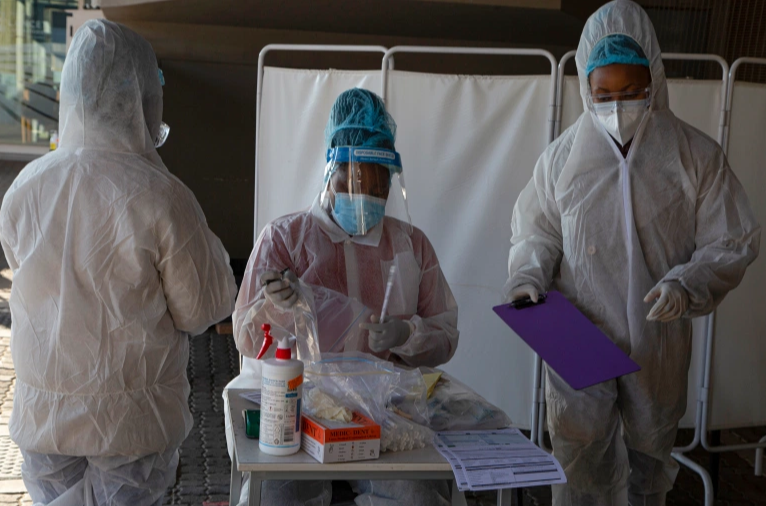
South Africa accounts for close to 40 percent of all COVID-19 deaths on the continent, with 60,038 officially recorded fatalities so far (Denis Farrell/AP Photo)
Cape Town, June 29 (RHC)-- From his 10-bed private clinic in western Johannesburg, Bayanda Gumende is more used to treating renal diseases than COVID-19. But with the city’s hospitals full, patients lingering in casualty wards for days and ambulances stuck waiting in car parks, that is beginning to change.
The 27-year-old chief nephrology technologist says he has been swamped with calls from patients desperate for oxygen and who cannot find it elsewhere. But with supply being limited, he is forced to prioritise.
“It has taken a toll on me. It is very emotional to watch people taking their last breath. Some people are gasping for air. There is literally nothing you can do about it. You cannot save everybody,” he says.
South Africa accounts for close to 40 percent of all COVID-19 deaths on the continent, with 60,038 officially recorded fatalities so far. It is currently in the midst of a third wave, driven by the rapid spread of the Delta variant, first detected in India, which is fast becoming the dominant strain.
Professor Salim Abdool Karim, a world-leading epidemiologist and former co-chair of South Africa’s Ministerial Advisory Committee on COVID-19, believes that a mutation related to furin – an enzyme that “cleaves” the spike protein – makes this variant particularly dangerous.
“That cutting process is critical. It enables the virus to enter cells more easily, and therefore spread faster,” he says. “This variant is about twice as transmissible as the other variants of concern.”
Science has translated into policy. In a televised address on Sunday, President Cyril Ramaphosa announced a raft of new restrictions, including the banning of all alcohol sales and gatherings, as well as an expansion of curfew hours from 9pm to 4am.
For Gumende, it need not have got to this point. “Waiting until the virus has spread uncontrollably has forced us to move into a far harsher lockdown than was necessary,” he says. “They knew that the Delta variant was spreading across India. They should have banned flights from India to South Africa.”
For now, Gauteng province – home of the country’s financial hub, Johannesburg, and its administrative capital, Pretoria – has been the epicentre of this third wave, accounting for more than 60 percent of new cases. As of Monday, the province had 81,399 active cases.
During a press briefing last week, provincial Premier David Makhura said, “We are struggling. We are under extreme pressure. The pandemic is everywhere.”
The situation in Johannesburg in particular has been aggravated after the 1,000-bed Charlotte Maxeke Johannesburg Academic Hospital was forced to close following a fire in April. But many believe the authorities are not entirely blameless.
“Where is the preparedness of the existing system regarding ICU, oxygen, diagnostics and treatment?” tweeted Tlaleng Mofokeng, the United Nations special rapporteur on the right to health.
Some large health facilities in Johannesburg, such as the Nasrec field hospital and the AngloGold Ashanti Hospital, sit empty. “There are a lot of unemployed doctors and nurses,” says Gumende. “It just seems ridiculous to me that the government has not prepared at all.”
If there is still some debate as to how South Africa became the worst-hit country on the continent, the way out of this crisis is clear, according to Karim. “The reality is that vaccination is a critically important part of trying to control the virus. We have to combine vaccination with some of our public health prevention measures.”

